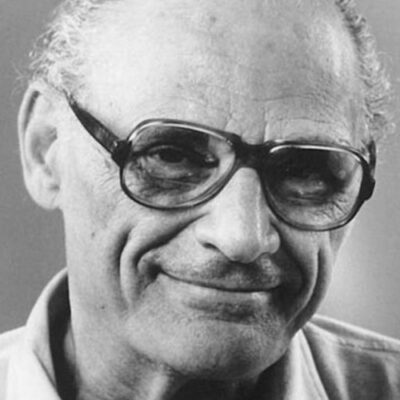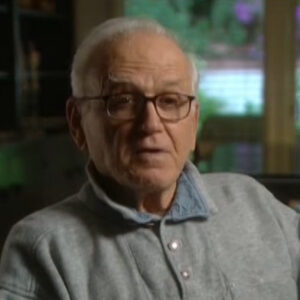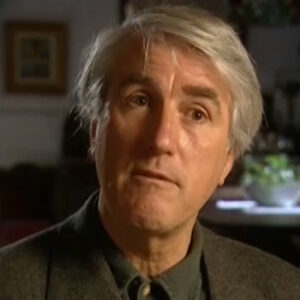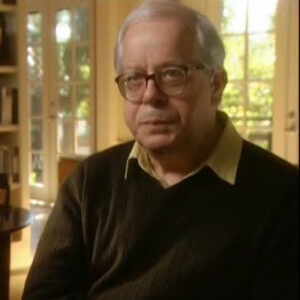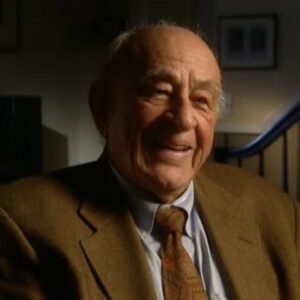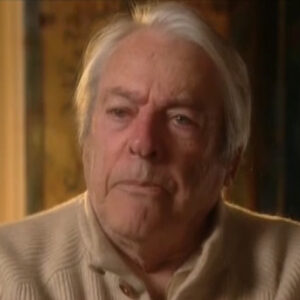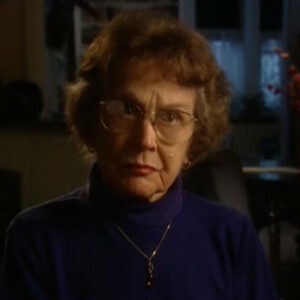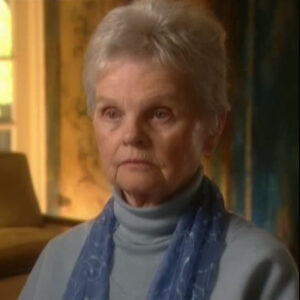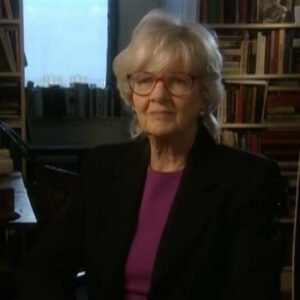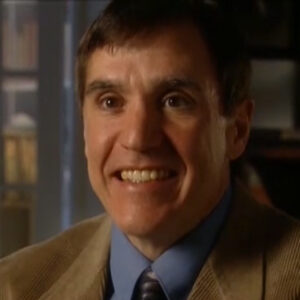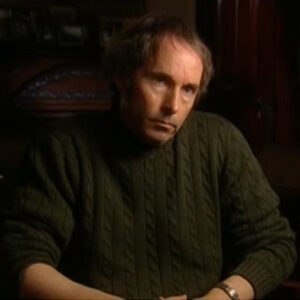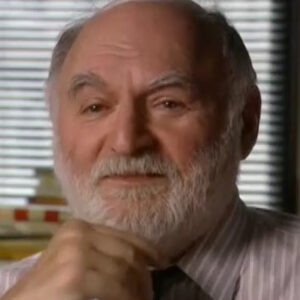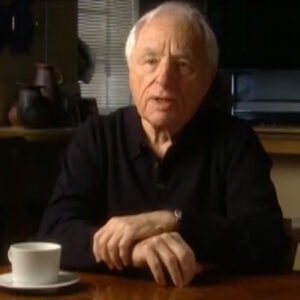Interviewer: We’re not anticipating 56 when we’re talking about the 30s.
Ellen Schrecker: It just makes it easier for you.
Interviewer: It just makes it easier to stay in the moment.
Ellen Schrecker: OK.
Interviewer: Unless I ask specifically.
Ellen Schrecker: OK, I’ll follow your lead. And if another thing since I know you’re editing.
Speaker Let’s start in the 30s. And you know, why would somebody like Kazan? Why would anybody join the Communist Party? I mean, what is the attraction? The thirties, t’s clearly a totalitarian system in the Soviet Union. There are perches of writers. There are purges of people within the Politburo. Why why join at that moment as I say, a totalitarian ideology?
Speaker You know, in the 1930s. A number of people, the Communist Party. Let me start over. In the 1930s, the Communist Party was probably the most dynamic organization on the left in the United States. And what we have to remember about the 1930s is there are two really major challenges at that moment. One is the depression. Even though Roosevelt begins to make a difference, there is still an enormous amount of double digit unemployment. There’s a lot of poverty. This is also a period in which labor unions are being organized. There’s a lot going on. And the Communist Party seems to be for somebody who wants to get involved in a movement for social justice, for people who are concerned about unemployment. People who are concerned about, you know, just getting basic necessities to other people for those kinds of people who with a strong social conscience. The Communist Party seemed to be the organization that was active, that was involved in unions, that was involved, for example, in many cities. Communists would organize with people on unemployment. They had unemployment leagues. These groups would often mobilize around where people’s houses, where people were being evicted from their homes and the marshals would go in and take people’s furniture out. And these communist groups would then carry the furniture back in.
Interviewer: You know, it sounds like what you’re talking about is a bunch of social workers. I mean, was there no kind of as we’ve come to associate communism language of worker revolution.
Ellen Schrecker: In the 1930s, the Communist Party had downplayed the notion of revolution. Their ultimate goal was a clearly a takeover and the creation of a communist state, a socialist state. But they were working within the real world at that time. Even Stalin was downplaying, at least for the rest of the international communist movement, an imminent revolution in a place like the United States where clearly that wasn’t about to happen. So people join the Communist Party. Yes, they believed in an ultimate socialist revolution. But many people were joining it because this was this was the movement of the future. This was the most active, the most dynamic movement in the United States on the left at this time. So an entire generation of radicals, people who in an earlier period might have joined the Socialist Party, who in a later period probably would have joined the new left. These were the people who joined the Communist Party. Yes. They knew about Russia. They knew about Stalin. But they kind of close their eyes, claiming in many cases, well, this is just capitalist propaganda and they base that what we now would consider a kind of conscious ignorance, as it were, on the fact that in the early days of the Soviet Union, the so-called capitalist press was circulating all kinds of rumors, you know, stories that were clearly not true about eating babies, things like that, so they could discount it and claim that was capitalist propaganda. At the same time, they could say, hey, no unemployment in Russia, you know? Yeah, sure, there were slave labor camps, but no unemployment in Russia. So that was one reason they many of the people that I interviewed, you know, former communists, said that in many respects that just wasn’t as important to them as what was going on in this country. The other big attraction of communism during the 1930s was the fact that it was Antine Nazi, that it was anti fascist, that communists were involved largely because Stalin A was concerned about the German threat to Russia.
Interviewer: The Communist Soviet Union were in some people’s minds the only people right?
Ellen Schrecker: Right. Remember, this is in the 1930s when the Western democracies were appeasing Hitler, when the United States was basically isolationist and refusing to become involved in imposing sanctions on Mussolini and Hitler and the Japanese, the communist. Were leading a movement that was at the forefront of an anti fascist anti Nazi coalition. And so are many people in this country. Jews in particular, who were very concerned about Hitler really felt that they had nowhere else to go. There was no other organized movement. And the other advantage of communism was that it was a worldwide movement. It was a movement that clearly and people felt this very strongly, that they were connected to anti fascist activities all over the world, especially, for example, the Spanish Civil War, which for many people was seen as an idealistic crusade against Hitler and Mussolini, who had intervened in that particular civil war.
Interviewer: Is the picture you mean to paint just to the communists are sort of a more liberal version of the Democratic Party?
Ellen Schrecker: The Communists like to think of themselves, I guess, as sort of the left of the Democratic Party. And in fact, in 1936, the communists basically supported Franklin Roosevelt for his second term. They couldn’t come out openly and say at all, though apparently it was pretty much understood that they were supporting the New Deal, because by that point, the New Deal had made it possible to organize labor unions. And presumably they were hoping that by pressuring Roosevelt instead of opposing him, that maybe American foreign policy might become more openly anti Nazi. It never did until after 1938.
Interviewer: But the party is in many ways a different entity than the Democratic party. You join the party. You register as a Democrat in New York City. You don’t really register as a communist pubicly right?
Ellen Schrecker: Right. The party is very different from other political organizations as we know it. It was a quote unquote, Marxist Leninist party. And what that meant was not only that, it was devoted to Marxism, that it was devoted to socialism, but also that it viewed itself as, quote unquote, the vanguard of the revolution. That when you joined the Communist Party, you were joining an organization that makes more demands of you, makes more demands of your time than a regular political party. It reminds me in many respects of, say, the Mormon Church, which demands that its members go out and proselytize. And the Communist Party was the same way during the 1930s, an active communist. I remember somebody I interviewed told me I think he gone to 28 meetings in one week. What the party expected of its ordinary members. And this was certainly one of the main reasons why people left the party, because it made so many demands on your time. It was not only that you go to party meetings, but that you become active in, quote unquote, mass organizations, which meant labor unions, which meant 80 fascist unions, which meant and the party had these organizations. They were later called front groups. But they really ways of sort of mobilizing different interest groups within the population. So, for example, there would be a photography group, a left wing photog, photographers, group dance groups, summer camps. There was even a. Insurance organization, a fraternal organization that sold insurance. And it was very actually very good because it was one of the few organizations that insurance companies that sold insurance to both blacks and whites and also sold insurance to people in hazardous occupations.
Interviewer: It seems the picture you’re painting is both benevolent in terms of things. But also almost cultish in that, you know, you’re really giving up a lot of yourself. Are you giving up independence and. You know, we talk about dissent so much of our story, was it possible within the party to dissent from the party line?
Ellen Schrecker: People within the party didn’t had to follow the party long line, quote unquote, on big issues. And certainly if you supported Trotsky, you were out like that. And you know, what the party saw as big issues was not necessarily the same thing that we might.
Interviewer: It seems to me one of the reasons Kazan breaks with the party. Many people break with the party in the 30s, even though they sympathize, is that they couldn’t brook the loss, the sense of self.
Ellen Schrecker: Yeah. Yeah. It really varied. The party was clearly a I don’t want to say totalitarian organization was certainly in this country, didn’t have the power, the state behind it, but it was a very all encompassing organization, was like its own world. And for many people, that was very comforting, comforting. I mean, there were a lot of people who liked the idea of sort of following this line because, you know, at the end, history was going to validate them. Right. But on another level, the party could also be stifling if it interfered with, say, your artistic production, if it interfered with creative work in some way. Interestingly enough, one group that I studied intensively were not theater people, but academics, and the party kept the distance from them. It did not make demands on its academics that they pursue this line of inquiry or use only these sources or follow the line in some. Oh, sorry.
Interviewer: Let’s just stop for a sec.
Ellen Schrecker: Yeah.
Interviewer: That it was born during Eisenhower, died during Eisenhower. But in terms of its birth is HUAC a part of 1950s America?
Ellen Schrecker: HUAC began in 1938. It held its first hearings in the summer of 1938. What’s interesting is that it was originally founded as much an anti Nazi as an anti-communist investigating committee very quickly. In fact, it turned to looking at communist. It very quickly turned to looking at calm. You want me to start over?
Interviewer: HUAC starts in 38 as an Anti-Communist organization?
Ellen Schrecker: As HUAC was originally founded to look into UN American activities, communist and Nazi. But it almost from the beginning began to look at communism. That’s mainly because its chair, Representative Martin Dye’s, was very strongly anti-communist and very strongly anti-communist because of the organization of labor unions and from the beginning. Hugh ACX was interested in eliminating communists from the labor movement, which was the most important area of American life in which the Communist Party had a foothold. And that’s very significant. So from the beginning, Hugh was looking for communists in the labor movement, in the federal government and in the entertainment business, the latter. And they began hearings, you know, in thirty eight, thirty nine into Hollywood very early, recognizing that big surprise. That’s where the publicity was.
Interviewer: So they’re there in Hollywood because it’s it it’s going to help their careers.
Ellen Schrecker: It’s going to help their careers to look at Hollywood. Also, there were communists in Hollywood. One of the things that’s significant to realize about the Communist Party was that it didn’t attract people randomly. You know, it wasn’t Mrs Average housewife walking down the street who got involved. It was people active in labor. It was a lot of intellectuals choose because of its attraction. It was attractive to Jews because it was so anti Nazi. And a lot of the Hollywood people were Jewish so that it went. Into those areas of American life where the communists were. It wasn’t random.
Interviewer: How much of this is a response to a real meaningful threat of communism and how much of this is a response to Franklin Delano Roosevelt?
Ellen Schrecker: Much of what HUAC was doing predates the Cold War. In other words, to act would have been looking at communists in Hollywood in the late 1940s and 50s, even if there wasn’t a Cold War, because that’s what they had been doing in 1938. So there’s a continuum. It’s part of a broader right wing swing and campaign against what the New Deal stood for. And it’s very much directed against the New Deal, against this sort of opening in the United States toward a sort of social democratic welfare state that seemed to be where much of the New Deal was heading and.
Interviewer: So the people like Rankin, people like Dies, the people like Thomas.The’yre are big fans of the Neal Deal?
Ellen Schrecker: No the people who were running HUAC who were behind HUAC, many of them were actually Southerners, were segregationists. Rankin, who was an important member of the early HUAC, was probably the most outspoken bigot in the entire Congress. He came from Mississippi. Also, a number of other people were involved with these hyper patriotic organizations like the American Legion. So what you have is a sort of coterie of real right wing reactionaries who then sort of view it is a constellation. Then the next circle might be sort of regular Republicans, fairly mainstream conservatives who were out to attack the New Deal or and not so much ideological grounds, but because it is expanding the role of the state. And then gradually, as the Cold War increases by the late 1940s, they begin to draw in more moderates or people who just are worried about what the Soviet Union is doing. And does it exercise control over domestic communism and are they in positions of influence?
Interviewer: Does the Commuunist party answer to Moscow as the charge goes?
Ellen Schrecker: Yes.
Ellen Schrecker: Yes, what?
Interviewer: Yes. The Communist Party does, in fact, respond to orders from Moscow if they get them. One of the things, you know, the cartoons of the 1950s always show Stalin manipulating the American communists, you know, as if they were marionettes with the strings. But often that wasn’t necessary because American communists were. Are quite prepared to sort of pre-empt whatever orders were coming from Russia, in other words, they carried out policies that they thought were going to be attractive to the Russians.
Interviewer: But there was not. It was not. It was not an independent party.
Ellen Schrecker: No the Communist Party in the United States was a branch of a larger international communist movement during up until nineteen forty three, it was part of what was called the common turned communist international. And if Stalin decided or the common turn in Moscow decided that we leadership should be changed, leadership would be changed. So, yes, there were orders.
Interviewer: It then decided the war is necessary. And then the Hitler Stalin pact, but knowing the war is necessary.
Ellen Schrecker: I mean, you got what you got in the 1930s and 40s. Were these very abrupt about face as these flip flops in the Communist Party line? The most famous occurred in 1939 when Hitler Stalin pact was signed between Hitler and Stalin and the Soviet Union, which up until then had been at the forefront of the anti Nazi movement. All of a sudden, pulls back, makes a non-aggression pact with the Germans. The Germans invade Poland and split it with Russia. Russia invaded Poland as well. And the American Party, which had been, you know, Antine Nazi antifascist all of a sudden, is totally blindsided. And you get several weeks there in which American communists, the Communist Party leader, really don’t know what to do. They sort of say, well, maybe Stalin understands some reason for making this pact, you know, but we’re still anti fascist. And they get a message directly from Moscow, from the head of the commentary telling them, no, you’ve got it wrong. You can’t just sort of say it’s it’s OK for Stalin, but we still are any Nazi. You’ve got to sort of say this is an imperialist war and you’ve got to attack support for the allies in the early days of the Second World War. So that’s probably the most, you know.
Interviewer: Picture for me politically of of what’s in the air in 47. I mean, America must be incredibly confident, secure nation. Just won the Second World War. We defeated Germany. We defeated Japan. We’re the only nation with the atom bomb. As I said, we must have a tremendous sense of security that no one could touch us. We’re on top of the world.
Ellen Schrecker: America in 1947 is actually at a kind of crossroads in terms of what’s going on in the world, in that this is the moment at which, in a funny way, President Truman declares the Cold War in March 1947. He goes to Congress and delivers what historians call the Truman Doctrine, in which essentially he’s asking for money to support the Greek civil war. Now, that’s a minor issue. But in fact, what he’s doing is sort of signaling to the American people that World War Two is over, but we’re involved in another international conflict. And so what you get at that particular moment, and it’s by no means the case that he’s going to get what he wants from Congress, which is several hundred million dollars of appropriations, because in 1946, Congress came under the control of the Republican Party. So in the 1946 congressional election.
Interviewer: I don’t want to get because this is more than I am going to be able to use.
Ellen Schrecker: OK, OK.
Interviewer: I guess what I want to get is what’s in the air. Is there a sense of secure? No, there is no.
Ellen Schrecker: OK. Then 1947 is a moment in which people are confused. I think more than insecure or more than worried, they’re just confused. All of a sudden there’s a Cold War, there’s a new enemy. We thought we were out of it. There’s a lot of domestic confusion as well in that there. There was a huge strike wave in 1945 and 1946. And there’s a sense as well on the left that this is a moment of possibility. Perhaps there’s going to be more social welfare. The New Deal agenda, the domestic agenda, the New Deal sort of came to an end with World War Two when Roosevelt said, doctor, when the war’s taking over from Mr. New Deal. And so what you have is a sense that maybe they’re we’re going to have national health insurance. After all, all the countries in Europe began to implement national health insurance. There’s a concern, beginning of a concern with civil rights issues, with integration. So there’s a lot of opening out at the same time because of the Cold War, because there is a Republican majority in Congress now. There’s a sense of the New Deal coming under siege. And it’s just at that moment in 1947 when HUAC begins to turn openly against communists in Hollywood. And that you begin to get in this new anti-communist agenda and on the domestic front, coming to the fore.
Interviewer: In terms of our security in the world there is no challenge to America, right?.We’re it.
Ellen Schrecker: We’re it but that doesn’t and the sort of sense of Cold War mobilization.
Interviewer: What’s going on in terms of the relationship with the Soviet Union that makes people feel.
Ellen Schrecker: OK. What what had happened during the war was that Roosevelt painted this very optimistic, very rosy and unrealistic picture of what the postwar world would look like, that the United States and the Soviet Union, which were allies during World War Two, would dance hand-in-hand into the future. That didn’t happen. Instead, Russia began to occupy countries on its border. The United States began to feel that Russia was acting aggressively. We now know that Russia felt it was just defending itself. But perhaps the perception, especially among allied policymakers, not so much the American public yet, but among allied policymakers, was that the Soviet Union was threatening to take over Europe and also take over implement a communist revolutions in Western Europe, especially in those countries like France and Italy, where there was a strong Communist Party. So that on the level of policymakers, we have an early sense of a international ideological conflict with the Soviet Union. And from 1945 46 till the beginning of 1947. That sense hardens. And in 1947, the Truman administration begins to sort of sell that view to the American public.
Interviewer: So let’s go to the Hollyhood hearings. HUAC goes to Hollywood in 47. They know that there are members of the Hollywood colony sympathizers that are party members. What are they really going to do? Do they really think that these writers are a threat to the internal security?
Ellen Schrecker: Why HUAC had to, in mind when it went to Hollywood was a kind of broader ideological mission. They wanted to make sure that Hollywood films weren’t not going to promote what they viewed as sort of anti American ideas. And I’ve seen the FBI files for Hollywood and there’s a lot of concern about Hollywood promoting anti business attitudes. A lot of concern about what they would view as a kind of left wing bias in the motion picture industry. And so that was really part of their agenda. The other part of their agenda was simply to get a lot of publicity. And you go to Hollywood and that’s where the publicity is.
Interviewer: OK so they call hearings. And who are the first people that they call people. People that they know? Very first witnesses?
Ellen Schrecker: When Hollywood began its hearing. When HUAC began its hearings in Hollywood, they called a combination of both quote unquote, friendly and unfriendly witnesses are the friendly witnesses, were studio heads, were some right wing actors and directors who had been involved in anti-communist activities in the film colony already. And they also called a group, actually 19 Hollywood people who they knew were in the Communist Party. Now, how did they know these people were in the Communist Party. Because they had evidence that the FBI had collected and given to them. We have a lot of documentation that shows that the FBI was working very closely with the House committee in preparing for these hearings. The FBI had performed a, quote, unquote, black bag job. They had essentially broken into the offices of the Communist Party in Los Angeles and copied their membership lists. And so they know exactly who is in the party. And they gave they photocopied people’s membership cards and gave those photocopies to the committee so that when the committee the committee did not. And this is very important because in the 1950s, people were critics of the committee were claiming that the committees called up, quote unquote, innocent liberals. The committees didn’t. They tended to call up, at least publicly, people who they knew had been in the Communist Party. Now, most of those people by the 50s had left the party. But nonetheless, the committee knew that they were in some way compromised. They in other words, these people may have been unjustly persecuted, but they were not incorrectly identified.
Interviewer: Ok. Let me ask you this question about that. Say Elia Kazan. They have a party card for him, or Alvah Bessie, or Dalton Trumbo. Let’s talk about the 10. Lester Cole, all those guys. Who cares? What difference does it make that you have a party card. Why is that iff you’ll excuse the phrase, an ace for the hole. Being a member of the party is not and was not illegal.
Ellen Schrecker: It was never illegal to be in the Communist Party. It was always unpopular. And the party from its beginning was a clandestine organization. It made its members keep their membership secret. And in fact, the only people who were sort of openly identified as being in the Communist Party were its leaders, its regular members, because even though it was legal, you could lose your job, you could be fired, you could be blacklisted in one way or another long before the Cold War. So that one. And this was one of these sort of no win situation, because later on, people began to accuse the Communist Party of being secretive, which it was. People would lie and deny they were members. So therefore, the party is accused of being deceitful. On the other hand, if people like schoolteacher’s public servants in particular, if you had admitted you were in the party, you would have been fired.
Interviewer: So why then for the committee is it a coup to call Dalton Trumbo and to have his card? It’s a rhetorical question when they ask him.
Ellen Schrecker: Yes. Yeah. Are the committee realized that exposure quote unquote was its most powerful weapon in eliminating people from the communists who were communists from any position of influence in American life? And because communism was seen as so undesirable, simply exposing somebody publicly as a communist was a way to ensure that that person would be punished and that the committees operated in the whole sort of political repression. The McCarthy period operated according to a two stage procedure. In other words, the first stage was identifying somebody, usually publicly, and then the second stage was imposing sanctions on that person, usually by getting them fired. So what you had here and each stage reinforced the other stage. So what what you ask is doing is not just quote unquote purifying Hollywood, but also further demonizing American communists because they’re seen as devious. You know, they lie. They refuse to answer questions. And the committee can sort of put itself forward is saying we’re just asking a question. You know, this isn’t an attempt to punish anybody. We’re simply asking questions that are related to national security. And it’s the connection between national security, the Cold War, the communist enemy overseas and the communist enemy at home, that internal enemy that makes the whole inquisition so incredibly powerful and so politically significant during this period.
Interviewer: So the Hollywood Ten take the First Amendment. Talk in terms of. And are held in contempt. In terms of the second phase, there’s the public phase and then there’s the sort of sanctions. Does the committee expect the studios to participate in the sanction phase at all when they come out or when they call in to Washington in forty seven? Is their expectation that Hollywood is going to cooperate in quite the manner?
Ellen Schrecker: Oh, yeah. The committees expect that the employers of the Hollywood Ten and later or their employers will cooperate and. Or they.
Interviewer: I mean, I guess what I’m asking you is, if this isn’t the needs of the committee that turns to HUAC. I mean, that turns to the studios and say, how about this Waldorf statement? Is it the committee that suggests the blacklist?
Ellen Schrecker: The committee does not suggest the blacklist as such. The Hollywood studios have always been very sensitive to public opinion. You know, this supposedly determines their box office receipts. And it’s important to realize the ninth, late 1940s is a very crucial time for Hollywood. This is a period in which they’ve just lost a major legal case separating movie movie theaters from studios. So they are suffering a major financial blow. This is a period when television is about to begin and draw their audiences away so that they’re in.Hollywood would feels very vulnerable. And it’s being attacked.
Interviewer: I was still talking.
Ellen Schrecker: OK, I’m sorry.
Interviewer: Go ahead.
Ellen Schrecker: No, Hollywood feels very vulnerable financially, also politically. They had done some real dumb things during World War Two. I think it was Warner Brothers made this movie called Mission to Moscow, which portrays Stalin as a sweet little old man. You know, it was pro-war propaganda, but it was done by a big mainstream studio. So Hollywood’s kind of feeling, you know, very, very vulnerable here. And along comes there’s really bad publicity with these 10 people taking the First Amendment, yelling at HUAC, being dragged out of the hearings. I mean, it’s very undignified. It doesn’t reflect well on the studios. And when the Hollywood 10 are indicted for contempt of Congress and there’s a possibility they’re going to go to jail, the studios don’t need an explicit message from Newark to do something they know or they feel that they’ve got to fire these people, separate themselves, make sure that they adopt a code which has no communists will ever work for a studio again. And so you get the beginnings of the blacklist in 1947, very early.
Interviewer: How much of that beautifully script laid out? How much you we talk about the blacklist and the context so often just the film or TV? Is it a misplaced emphasis or does Hollywood set a pattern for what’s about to come with that Waldorf Statement?
Ellen Schrecker: The Waldorf statement is incredibly important because it starts to set a pattern for blacklist, not just in the film industry, not just in television, but in the academic community, in the labor movement. You have blacklist extending through out society in many people who were affected. I studied academics, for example, which where you would think there would be even more freedom of speech. Once a somebody is called before a committee is exposed as having been a former communist takes the Fifth Amendment, that person normally can’t get another teaching job in the United States. There’s a really pretty complete blacklist within the academic community among regular industrial workers. Same thing happens often. It’s implemented by the FBI. The FBI will go to people’s employers and make sure that those people get fired.
Interviewer: So Hollywood is a template?
Ellen Schrecker: Hollywood is a template for a blacklist that’s gonna extend throughout the entire economy.
Interviewer: Can I ak you a silly question?
Ellen Schrecker: Yeah.
Interviewer: How does a housewife get blacklisted? Were housewives blacklisted?
Ellen Schrecker: Housewives were not blacklisted because obviously, unless their husbands divorced them, they didn’t lose their jobs. But people would be expelled from the PTA or their neighbors would stop talking to them if they were involved. And remember, the people who are affected, the people who are being called up by the committees are politically active. These are people who had once been in the Communist Party or were still in it. So they’re very active in a number of community organizations. And there they will be sort of marginalized or else they take themselves out of political activity. I mean, one of the effects of this blacklisting is a silencing of quieting, of political debate. A withdrawal on the part of many people would otherwise be very active from political work. A good example is, Betty, for Dan, who was had been in the party or sort of very near the party, had been a labor journalist in the late 1940s. She loses her job because the labor union she worked for was itself destroyed by McCarthyism and, you know, couldn’t keep her on the payroll. And she begins to withdraw from political work. She continues to write articles, but she’s writing articles now, not about political subjects anymore.
Interviewer: So what affect does the committee have on dissent?
Ellen Schrecker: The main impact of the committee on dissent is that it’s going to narrow the range of acceptable issues that can be discussed in public. It’s got, for example, in the civil rights movement until its effect. It’s not just about communists.
Interviewer: It seeps into more of.
Ellen Schrecker: Right. Because the Communist Party was the lead was the most dynamic part of the left. When it gets attacked, the left itself is under siege. And a whole set of ideas that were up. American political discourse and American political debate moves to the right because the left is chopped off, set, you know, thrown out, said this isn’t this isn’t acceptable to too close to communism. We can’t possibly go along with it. And so whole questions are simply dropped from the American political agenda. There’s no criticism of the Cold War. When when I teach the Korean War, for example, I asked my students to tell me about the anti-war movement during the Korean War, which we know was as unpopular in many respects as the Vietnam War. But it took place during the height of the McCarthy period. And my students, I ask them to talk about the anti-war movement during the Korean War and we get silence. And I say, yep, that’s the right answer. There wasn’t any anti-war movement during the Korean War. Why McCarthyism? And you can see this in a lot of other fields. There had been an attempt, for example, to implement a kind of national health insurance under Harry Truman. Bang! Socialized medicine. It’s attacked by the medical lobby and drops from the agenda.
Interviewer: So. As soon as he one more question about. Government in terms of the FBI and the Hollywood moguls, in terms of private industry, what. What are the other groups that are out there determining who can work and who can’t not work?
Ellen Schrecker: The blacklist actually operated in a very interesting way. There was a group of what I call professionally hated communists. Some of them worked for the government. Some of them were what we today would call consultants. Some of them were involved with organizations like the American Legion. And I ran across evidence of the Hollywood blacklist in a number of different files of these groups are a UN group of about eight or nine people gave the Hollywood studios the names of actors who were blacklisted, who then had to or grey list. And you were blacklisted if you took the Fifth publicly. But there were other people who had signed petitions, stuff like that.
Interviewer: Well, explain it to me. What’s the difference between a blacklist and graylist?
Ellen Schrecker: A gray was a blacklist means that’s it. You’re not working because you’ve been publicly exposed. But the people who had signed the petition say for release of a. Let me start over. People got greylisted if they signed peace petitions in the late 1940s, if they sent money to various defense groups defending communists, if they were sort of active in some kind of left wing or civil liberties group. And the Eddie Compass network had these people’s names. Often they collected them from letterheads of organizations. And these people often could work if they were willing to clear themselves. The names were given to the studio heads, the studio heads. Then we call people in just about every film star, in fact, because the entertainment industry was more liberal in that period. And so people would be called in and they would be told, you signed the Stockholm peace petition in 1947, you must give an explanation. And then these people and they’re very famous. I have seen Marlon Brando’s, for example, he signed a petition, I think, and they would write the letter usually, of course, with the help of their agent, their lawyer sort of saying, I was young and my director came in and asked me to sign something and I signed it. I didn’t even read it, you know, sort of trying to exonerate themselves. And then this group of professional black listers, people one of them was a research head of research for the Senate internal security in the subcommittee. One was a private consultant. There were several right wing Hollywood actors. They would read these and decide whether they were acceptable or not. And if they weren’t acceptable, then they tell the studio and the actor or director or whoever would have to revise the letter. So I actually photocopied Marlon Brando’s. There’s several different versions until finally he said the right thing.
Interviewer: But it’s not just Brando I mean it’s Brando. You actually have people like Bogart.
Ellen Schrecker: Everybody. You know what, if you had done something that positions you on the left and your name is somewhere in on a letterhead or signed a petition or something, then these professional 80 communists would have you. You know, you’d have to clear yourself.
Interviewer: This doesn’t sound a whole lot about the security of the nation.
Ellen Schrecker: It had nothing to do with security. This is a kind of ideological moment. No. The words you have to proclaim your loyalty. It’s I hate to say, very similar to what’s happened since September 11th.
Interviewer: But it is a witchhunt, purge?
Ellen Schrecker: It’s certainly a purge in the sense that what’s being demanded is not just loyalty to your country or these people were perfectly loyal, but rather adherence to not just even a particular political ideology, but ultimately, at least within the entertainment industry, which really got very vicious. A willingness to support the purchase. In other words, you had to go along with the purchase and sort of say, oh, no, there’s no blacklist. You know, we’re all loyal Americans here. Otherwise, you’d be blacklisted.
Interviewer: You know, I want to just jump back because we’re talking about Bogart and these letters, but they’re really pullet articles published in this post and places like that right. Bogart is at the vanguard of what’s called the committee for the First Amendment. And it’s not certain, is it, when HUAC first arrives that they’re going to have a successful set of hearing. Is it a foregone conclusion that HUAC is going to end?
Ellen Schrecker: In 1947 when HUAC begins its Hollywood hearings, it’s huge. Act doesn’t necessarily have a great reputation. You know, it’s considered flaky. It’s considered extremist. And it’s by no means the case that what it’s doing, exposing people’s communist, which after all, remember communism was legal, was going to have such a devastating effect on these people. And at the time of the hearings, a lot of Hollywood liberals, you know, big name stars, Bogart, Lauren Bacall, Danny Kaye, all of these people went to Hollywood, not so much to support the tan, but to I mean, sorry, these people went to Washington. They, I think, chartered a plane. They got lots of publicity. They’re not really supporting the tents so much as they are attacking the committee for violating sort of accepted notions of civil liberties. And it’s only when it becomes clear that the ten actually are communists, that these people begin to pull back and that the committee, as it were, begins to gain more and more legitimacy with the broader public.
Interviewer: So why is it that when they show a Communist Party card, that’s a problem for Bogart. I mean, they were people like Bogart, Bacall, Danny Kaye, John Houston, all these people that make up the committee for the First Amendment. Were they there to defend the Hollywood after they had been called and why?
Ellen Schrecker: What’s interesting about liberals like the people who were organizing committee for the Hollywood 10 is that all along there was a sort of question of whether communists were legitimate. And what happened during the 50s, and it begins in 47 with this Hollywood 10 hearing, is that the consensus is that you can defend the civil liberties of everybody but communists. And once somebody is identified as a communist that puts a person beyond the pale, then you can be fired from your job in a university. You can be black. Stood by the film industry. The federal government hasn’t even broader definition of what a communist is. But what also happens during the 50s is that the definition of communism begins to expand. You know, it’s not just having a party card, not just being a quote unquote card carrying communist, but also a Fifth Amendment communist, somebody who is attacking the committees, somebody who is dissenting. So it begins to expand to an ever broader sort of notion of what is no longer legitimate.
Interviewer: Last question about the 47 hearings. You do a lovely job about it, the whole thing don’t really help their case when they get called to testify do they?
Ellen Schrecker: The Hollywood Ten blew it, they blew it largely be for a number of reasons. One, they didn’t realize how awful the committee was going to be. They had all prepared these statements about I am a flag waving American and this is my constitution, too. They also believe that they were going to be protected by the First Amendment and their lawyers believe that is well. There was no reason for them not to believe that up until the late 40s, the Supreme Court looked like it was going to protect this kind of First Amendment behavior. This kind of free speech. What happened was the Supreme Court was swayed by the Cold War in this sort of growing atmosphere and concern about national security to such an extent that during the 1940s and early 50s, it pulled away from defending people in the area of communism.
Interviewer: Legal stuff aside, they’re not a particularly appealing group of.
Ellen Schrecker: The Hollywood Ten shouted at the committee. The committee shouted at the Hollywood 10. They some of them were sort of spouting a kind of canned popular front type rhetoric that really sounded canned and popular front type. They were people. I think a lot of people were turned off by the contentious nature of the committee hearings. They were not genteel. The Hollywood ten were not genteel. The committees were not genteel. And, you know, there was a lot of shouting. And I think a lot of people said, hey, wait a minute. Do I want to be do I want to support this? I wouldn’t behave like that before a committee. These people are maybe beyond the pale.
Interviewer: OK, let’s jump to Kazan in 52. The atmosphere in 52 has gotten better since 47 in terms of the fear of communism and the specter of communism. Kazan is entering a committee that is. softer.
Ellen Schrecker: The change in the sort of political atmosphere in from, say, 1947, when the committee began to harass Hollywood communists to 1952. The committee is hardening. It’s becoming actually what. What happens is that it becomes routinized that the committees you don’t have screaming matches between committees and their witnesses that you had in 47. It’s now a very ritualized they. The committees knew always had executive committee hearings in which secret hearings in which they would test their witnesses to see if the witnesses were going to cooperate or not.
Interviewer: That’s what happens to Kazan right?
Ellen Schrecker: Yeah, well, the idea is that the committees are going to call people up. And what they’re looking for is to have people named names to say who is in was in the party with them. The reason they do this, it is psychologically it’s a very important kind of moment for somebody who may have been a communist and is no longer and is willing to talk about what he or she had done in the party, but doesn’t want to become an informer. There’s a sort of visceral dislike for informing and naming names. And the committee knows this, and it uses the idea of forcing its witnesses to name names as a way of it claims proving that that person has broken with the party. It’s an ideological test. And the only way that you can pass this test, according to the committee, is to do something that is morally repugnant to most people. And so the committee holds its hearings initially and a first executive session away from public where they go through their list of questions, the answers to which they know already. And they will ask somebody, you know, were you in the party? Yes. Who was in the party with you? And then they read the list of names. They know who was in the party with somebody. So they’re not out there trying to get information. They’re out there trying to impose an ideological test when it’s their witnesses which legitimises the committee as well as the whole witchhunt.
Interviewer: Walter actually said. OK, Walter actually said to me that they had the names and they weren’t they didn’t want the names. What the wanted was your name. What they wanted was to be able to say this person helped the committee, you know, which is why Kazans, I think, hurt so much. But what kind of pressure is existant in 52 on Kazan? I mean, you know, you talk about everything being and I think rightly being ritualized. So Kazan gets the subpoena. He gets his pink slip. What does he know now as part of his ritual?
Ellen Schrecker: You get a snippet here. When Kazan got his subpoena in 1952, what he knew was that if he went before the committee and refused to name names, take it, and took the Fifth Amendment, that he would no longer be able to work in Hollywood. His career in the movie industry would come to an end. What he could have done is perhaps going overseas. A lot of blacklisted people went overseas and made movies there. It wasn’t until I started working on this that I realized this Jewel DSR was not a Frenchman, but a blacklisted American. And Joseph Locy was not a British direct film director, but a blacklisted American so people could go overseas and make careers that way. He could also have gone to New York and Broadway and worked in the legitimate theater because Broadway, the theater, did not impose a blacklist. It had a much smaller audience, a much more liberal audience. And Broadway producers throughout this period tended to be able to hire a much wider range of talent than either films or TV with their nasch nationwide audiences could do.
Interviewer: I see. So because Broadway’s audience doesn’t give a should… They don’t have the same pressures put on them.
Ellen Schrecker: Yeah.
Interviewer: Yeah. So Kazan knows either he gives up the names or he doesn’t work. Now, give me a sense, too defensive you can Kazan’s impression of the committee and his impression of the party. I mean, he’s he talks in his own memoirs of being disgusted by both. And if you’re a member of the party. Why by 52, would somebody like Kazan have. You’ll will sense of betrayal from the party. He’s not unique.
Ellen Schrecker: There were a lot of people who left the party even before the McCarthy period because it was imposed. It was too rigid. I mean, the party was always ideologically trying to do what it felt was.
Interviewer: Kazan feels bitterness. Talk to me about that.
Ellen Schrecker: Oh, OK.
Interviewer: If you can personalize it a bit.
Ellen Schrecker: For somebody like Kazan, who is clearly an individual artist who clearly needs space. Probably the thing that’s most annoying, most destructive about the party is the kind of Stalinist mentality that some of its members display. There is a kind of rigidity, a kind of sort of narrowness of language and narrowness of thought that characterizes much of the party, often sort of the lower level party officials, people who are coming in to sort of you come in and say there’s a party meeting, you have your unit, you’re talking about propagate, and somebody from a higher level will come in and sort of give a party line that’s very rigid, that’s very sectarian. And that can be very off-putting.
Interviewer: But, you know, it’s not. There is certainly that for Kazan. The sense of having to march on the step. I think he’s also looking at the world stage. He’s seeing purges now. I feel he and Bud Schulberg, there are plenty of people who feel as though they were on the wrong side. Is that fair? You get as gee, you sympathize in any way as a scholar with this idea that Kazan says in his memoir that he had two really awful choices before him when he gets his subpeona. There was no good way to go.
Ellen Schrecker: Yeah. I think one of the problems that people had here was that the Soviet Union, by the late 40s, if you had any sense of what was going on, its very clear was a ghastly place that especially for intellectuals, that it had purged many of its most important creative souls, that the purges of the late thirties were utterly horrendous. And so many people, I think, were really disgusted, horrified by what was going on. The Soviet Union did not want in any way, shape or form to be associated with it.
Interviewer: And so Kazan is called before the committee, in fact, to defend a party that he now finds disgusting. Is that fair?
Ellen Schrecker: I think that’s fair, that somebody like Kazan would be called before a committee and feel that taking the fifth, which is the only way you can avoid naming names, would identify him with the Communist Party because the party, in fact, instructed its members to take the fifth. And you didn’t have witnesses saying, I am taking the Fifth because I am no longer in the party and I do not want to name names. They they couldn’t even say that, as opposed to people who were in the party who were saying, I am taking the fifth because the party told me to.
Interviewer: So part that out for me a little bit more. It’s going to be confusing on television. Dalton Trumbo said at one point you got the pink slip. You know, you try to sell your house, you don’t tell anybody about it, try to amass as much money as you could. And you became prepared to be a nobody. Kazan gets his pink slip. Is Kazan like Trumbo, a party member believes the committee is wrong and the decision is, in fact, for someone like Kazan an easy decision?
Ellen Schrecker: When you got your subpoena from HUAC and for somebody like Kazan by 1952, you knew what that meant. It meant name names or leave Hollywood. Essentially, it was a very stark decision. It was there. There was no way you could negotiate out of it. You had to name names or else. And Kazan must have felt just, you know, blindsided. I mean, he must have known it was coming. But of for somebody like Kazan. It’s a terrible I think, a lot of people. Let me start over. When Kazan got his subpoena, he knew by 1952 anybody who gets a subpoena from HUAC knows that he had to name names or else leave Hollywood, that there was going to be a blacklist. Friendy, Do you want to leave?
Interviewer: Again, help me understand, Kazan gets a pinkslip. What is Kazan is expecting? What are his options? Does he have a sense?
Ellen Schrecker: When Kazan gets his subpoena from HUAC in 1952? He’s very aware of the fact that he has two options. Either he can name names or he can give up his career as a Hollywood director. And that’s it. It’s very stark and it’s very, very unpleasant. Nobody wants to have you know, and you sort of think of think yourself into the heads of these people and you think, what would I do under these pressures? You know, would I give up my career? Is it so important? Are.
Interviewer: Let’s leave it there. Yeah.
Ellen Schrecker: Okay, you want me to start over?
Interviewer: You know, I’ll keep asking questions. We’ll get back. The kind of pressure Kazan’s got. Does he feel like he can maneuver out of it, does he feel like I’m Elia Kazan. I’m one of the most important director in Hollywood. I’ve won an Academy Award. I’ve won a Tony. My plays have been winning Pulitzer prizes. I could rise above this mess.
Ellen Schrecker: Even Elia Kazan knows that in 1952, if he defies Hugh and refuses to name names, he is no longer going to be working in Hollywood. And he knows that. And it’s a terrible thing because here is somebody who wasn’t asking for this kind of moral choice to be made. You know, he’s not a willing volunteer. He’s not going up the you and say, question me, I’d like to talk. He’s sort of saying, you know, I’d rather not have to deal with this, but he does have to deal with it, as did everybody who was subpoenaed. And it’s a clearly the most serious moral dilemma that any of these individuals have faced. And it’s a horrible dilemma. And for Kazan, I think it’s made worse because if you take the fifth, you are automatically identified with the Communist Party. And for somebody like Kazan, who so alienated by the Communist Party, who’s been there and realizes how suffocating, how rigid, how undemocratic it is and what a terrible, terrible regime the Soviet Union is, the thought of sort of falling on his sword, destroying his career as a film director for that. I mean, you know, you can understand why he might be willing to try to wiggle out of it in some way, but there’s no way to wiggle out. You’ve got to name names. You’ve got to go through what Viktor Norvasc he calls the degradation ceremony that the Inquisition has imposed on people.
Interviewer: And what does the cost of naming names mean to ones own? I mean, you talk about, you know, morally compromising yourself for that for the Communist Party. But the other side of the coin is?
Ellen Schrecker: Is you’re an informer for the rest of your life. You feel that, you know, there is in our culture a very, very strong distaste, dislike for people who squeal stool pigeons. I mean, think of all the words that exist to identify somebody who name names. And especially since you know perfectly well that what the committee is doing is illegitimate, that what the committee is doing is imposing a politically repressive witch-hunt. You’re not giving them information they don’t have. The committee has all the names, usually the naming names. Part of somebodies testimony is the committee counsel will say, was Joe Smith in the party with you? Was Bill Jones in the party with you? You know, was so-and-so in the party with you? They know the answers. You’re not giving them information.
Ellen Schrecker: So it’s not informing in the sense that we talk about informing, say, terrorist plots or things like that. I mean, you’re not actually doing anything.
Interviewer: Exactly. When somebody, quote unquote informs when somebody is naming names, they’re not giving information to the committee that is necessary for national security. What they are doing is going through a ritual, sort of essentially confirming the committee’s mission, signing on to the witch hunt by giving names. They’re doing they’re not doing it voluntarily. They’re doing it under duress. Somebody like Elia Kazan, if he hadn’t been subpoenaed, certainly wouldn’t have gone to HUAC and said, hi. I’d like to give you a few names, fellas. You know, that isn’t what happens. These people are, you know, under incredible pressure. And it’s a question here of somebodies own internal integrity, whether or not that person is willing to stand up and and sort of self-destruct his or her own career.
Interviewer: Let me ask you a question. We talked when we met several months ago. There were arguments, people like Kazan people like my Budd Schulberg, who it affects their actions or whether they were people who were defending corrupt and evil systems that killed tens of millions of their own, swallowed up huge parts of Europe, that repressed human rights, that there were people in this country that were saying that the purges were anti Soviet propaganda, that people like Isaac Babel weren’t being killed, that there were no gulags. On and on on. And. What would you say to somebody like Kazan who says, look, whatever I did, whatever moral failings I may have done in naming names. It’s nothing. Compared to endorsing what is clearly in everybody, right thinking mind a corrupt totalitarian system. I was on the side of the.
Ellen Schrecker: One of the problems is that the committee is kind of forcing people to identify themselves with the Communist Party by taking the fifth the fifth itself. The party had ordered its members to take the fifth. And so it was well known that if you took that communists took the fifth and the committees then sort of took that particular piece of information and ran with it and said everybody who takes a fifth is a communist. And so since the Supreme Court refused to let people talk about themselves, talk about their own political activities, and then refuse to talk, talk about others. It had were insisted that these people had waived their right to the fifth and they could then go to jail. What that meant that waiver or doctrine meant was that you couldn’t explain your own political views before the committee. You couldn’t say yes. I was once a communist, but I now see how awful the Soviet Union was. I see how terrible the purges were. I see the Soviet Union is, you know, a terrible system. And I certainly don’t support it. But I just don’t want to name names of these other people who’ve also left the party. People couldn’t say that Lillian Hellman tried to. She’s the most famous example of somebody who wanted to say, yes, I was in the party, but I’m not anymore and I’m not going to name people. But you can ask me about myself. The committee refused to accept that. And as a result, what that meant was anybody who was called before a committee really didn’t have a very wide range of options with regard to what that person could say at the time of his or her hearing.
Interviewer: Interesting enough Arthur Miller gets called up in 56 and does just that. He talks endlessly about himself and they’re very nice and cordial to each other. And he talks. Almost gives a lecture. He talks such and such a great length and then gets to the point where he says, you know, please don’t ask me that question because I can’t. You know, I don’t want to go against my own sense of self, and it’s a very cordial and everybody at the end, the end of the end of the hearing. They asked him, why dont you write better plays, you know, more pro-American stuff. How does Miller get away with it?
Ellen Schrecker: There’s a big difference between hearings that took place in the early 50s and hearings that took place after 1954, which is when Joseph McCarthy self-destructive before the nation’s television audience. And you had all of a sudden a kind of revulsion against McCarthyism and going too far.
Interviewer: What happens to McCarthy that he self-destructs? As distinctly as you can who does he go after that?
Ellen Schrecker: OK. It’s the big turning point, I think, in public perceptions of the committees in the can, the witnesses perception of how much they can get away with. The big difference. In other words, between the testimony that Kazan gave in Arthur Miller gave, is that by the mid and late 50s, McCarthyism was no longer so dominant. Joseph McCarthy, you know, who gave this whole phenomenon a name, had gone too far. He had begun to call up army generals and quiz them about, you know, being soft on communism. And that had precipitated a kind of revulsion, especially within the Republican Party. And so what you had was the beginnings of a kind of rollback so that somebody like Arthur Miller could begin to expand. He he didn’t have quite the same sense that he couldn’t talk about himself, that the Supreme Court. The legal situation was beginning to change. And in fact, Arthur Miller was indicted for contempt of Congress. But by the time his case got through the courts, he was able to avoid on a technicality, on a technicality that the committee had gone. I forget exactly what the precise technicality was, but the court was essentially saying the committee was going beyond its jurisdiction, that it couldn’t ask certain kinds of questions. In other words, the court, which had given the committees, had given the whole witch-hunt structure a blank check began to pull back and began to limit the area in which committees could ask questions so that it didn’t do that, hadn’t done that before 1950 to Kazan. If he had, Riffe done what Miller did, probably would have gone to jail. So what you had was a narrowing of what was legally and politically acceptable throughout until 1954 and then in opening out.
Interviewer: Can I have you say it again? Does it really? You think Kazan would have gone to jail if he had done.
Ellen Schrecker: It’s very hard to say that.
Interviewer: For a minute, let’s say Kazaam doesn’t in 56.
Ellen Schrecker: Talks about him.
Interviewer: What are the consequences? If Kazan does what Miller does what would have happened?
Ellen Schrecker: Supposed Kazan, instead of naming names, had done what Arthur Miller done and talked about his political past, what he had believed, why he had left the Communist Party, what he thought of communism. But then when the committee said and was Joe Blow in the party with you, he said, I’m sorry, I am not able to answer that question. He would have been indicted for contempt of Congress, just as Miller was, and he probably would have gone to jail. Now, the interesting thing is that very few people did that up until somewhat later. There were a number of academics, for example, who were called up in 1954 who took the First Amendment, who said, you know, the problem was that the Fifth Amendment didn’t allow people you had to take it very early in your testimony and couldn’t talk about yourself. And the First Amendment and people were then accused of being Fifth Amendment communists.
Interviewer: Miller in 56. What’s different for Miller?
Ellen Schrecker: By 56, I think what was beginning to happen was a kind of revulsion on the part of the legal system against throwing people in prison for refusing to name names that, you know, not squealing really was an a crime. And it was very hard for the court. Often the people’s lawyers assisted the court in sort of trying to find other excuses for allowing them to avoid questioning. And the court began to accept those excuses, whereas probably several years earlier they wouldn’t. And interestingly enough, several years later, the court opened up in the mid 50s and then it closed down very quickly in 1959 six. They’re a bunch of terrible opinions and fifty nine. Sixty one where the court closes down and throws people in jail and then it opens up and McCarthyism disappears.
Interviewer: So there’s a certain kind of burning itself out.
Ellen Schrecker: Yeah.
Interviewer: OK. Just if I could stop for quick sec. Is HUAC over as the 50s out?
Ellen Schrecker: HUAC loses its front page appeal by the end of the 50s, in part because they run out of targets, they run out of people to subpoena. They really aren’t. You know, people are being called three, four times and they’re sort of dropping out of public life. Hugh White doesn’t really lose its legitimacy until the 60s, until a number of hearings where people simply make fun of him. Hewar. You know, there’s a wonderful hearing in the early 60s. They take on a peace group called What’s It Called? I think women, women strike for peace. And these are women who are peace activists who are concerned about banning nuclear bombing. And they’re not communists search. They’re political activists. They’re peace people. And whoever calls up these women and they make fun of HUAC very suddenly. They get very dressed up elegantly as if they’re very, you know, very ladylike, as if they’re going to garden wedding. Their leader, a woman named Dagmar Wilson, is called up to testify.
Interviewer: This is more than I’m going to be able to do.
Ellen Schrecker: OK. It’s a wonderful story.
Interviewer: But HUAC sticks around for a lot longer than people think.
Ellen Schrecker: Yeah.
Interviewer: Give me a sense.
Ellen Schrecker: The witch hunt does not. And in 1954, when Joseph McCarthy sort of, you know, is shown up for being a buffoon before the Army McCarthy hearings.
Interviewer: Let’s ties it to Miller in 56. Is Miller the last of the HUAC hearings? Is Miller the end of HUAC?
Ellen Schrecker: HUAC Hearings begin to peter out by the 19 late 1950s? There aren’t these huge extravaganzas, huge whack, and then begins to attack its own enemies. So it also, interestingly enough, begins to establish alliances with Southern segregationists, begins to hold hearings. HUAC and it’s its companion committee, the Senate Internal Security Subcommittee will begin to hold hearings on infiltration of communists in the civil rights movement, stuff like that. So it becomes regional. It’s no longer at the center of American politics, but it’s still out there and occasionally does throw people in jail for contempt. But by the late 50s, it’s no longer central to American politics the way it had been, say, five years earlier.
Interviewer: So it’s stripped of its committees. The committee disappears?
Ellen Schrecker: The committee never disappears. It continues until the 1970s, but it doesn’t have. People aren’t afraid of it. You know, a HUAC subpoena is no longer is an automatic career killer.
Interviewer: But I think people would be surprised to hear that HUAC sticks with us until the 70s.
Ellen Schrecker: Yeah. HUAC lingered it because there was always this hard core, any communist network, this group of professional anti-communist who didn’t disappear. They had been there from the 1930s. They they sort of remain as a car. And you can trace them through the 1930s, through this 50s, through the 60s, through the 70s. They’re still around in the 1950s. They have more allies. They have more legitimacy, but they’re always there. And they’re they do maintain control over HUAC until finally it then big gets renamed. I think it’s the House Internal Security Committee and then it finally disappears.
Interviewer: Let’s take. About five, ten more minutes. I’ll give as much room to run as possible. It seems to me that the is thought of. Discussed today maybe only in the manner that, you know, it seems that I’m talking about it witch is Hollywood, television, maybe to a lesser extent radio. I guess in some ways it’s understandably valid. There were a lot of lives that were really careers that were cut short or put on hold. But is it your sense of that? That’s the main legacy. Is that why we should go back and look as Dalton Trumbo said of curiosity on that dark time? The fact that people lost their job?
Ellen Schrecker: I think the blacklisting was certainly for the people involved. A terrible moment in their lives. Tragic if you were certainly for some people who died and killed themselves, it was definitely tragic. But I think that if we look in a broader way, add the social damage of McCarthyism, what did it do politically? It’s, I think, a much more serious problem, because what it did was it essentially shifted American politics to the right by totally, really destroying the influence of the left. And by narrowing the range of what it was acceptable in American politics, what was acceptable in mainstream politics. There was no more criticism of American foreign policy in the Cold War. There are within a whole.
Interviewer: I want to look for a more short answer. But it seems to really narrow acceptable dissent. Is that fair?
Ellen Schrecker: Yeah. During the McCarthy period, its main impact was to narrow the range of what was acceptable. To talk about that dissent from the Cold War was no longer acceptable. Dissent from capitalism, from free enterprise was no longer acceptable. There are a whole range of issues were simply thrown off the table that it was no longer considered even politics, to talk about something like national health insurance or some forms of public housing. These kinds of issues were were seen as illegitimate. We couldn’t talk about them.
Interviewer: So does McCarthy have any legacy then?
Ellen Schrecker: I think the legacy of McCarthyism is the legacy of all the things that didn’t happen. And it’s very, very hard to really take an accounting of things that didn’t happen. Books that were written, plays that weren’t performed or written, organizations that weren’t established are questions that didn’t come up. And I think, you know, it so silences and those lost options that are the real legacy of McCarthyism. Besides the things that we know directly or indirectly or were caused by it. For example, let’s take Vietnam certainly.
Interviewer: That legacy is. I like that idea. That is the things that we don’t know. The silences that become the legacy of McCarthyism. OK, let me ask you one of the ways that Hollywood tries to show it’s patriotism is the Waldorf Statement. That is the purging and is blacklist but is that the only way?
Ellen Schrecker: Besides the blacklisting and its desire not to have anybody associated with communism working in the film industry, are Hollywood also made a number of 80 explicitly anti-communist films. And there are a number of them. There’s one Kowalke Eastern Bakin in my son John. I was a communist for the FBI. These are all what we today would call docu dramas. They’re sometimes based on the quote unquote true experiences of people involved. And what they’re what they do. My favorite is one called I was a communist for the FBI, in which they tend to portray communists in the genre of a gangster film. Communists are thugs. Communists are often portrayed in foreign accents. They’re devious. They’re in. I was a communist for the FBI. The communist boss of Pittsburgh is planning to destroy the steel industry. The whole notion what they’re trying to do is create these daemonic demonized stereotypes of communists that will present the whole question in black and white. And, you know, obviously the heroes are the people who stand up, who name names, who are turning the communists, who, you know, when there’s orphan fights and, you know, the good guys or the FBI. Of course, the committees are the good guys. Often the apotheosis, the end of a film will be somebody coming out testifying about all the terrible things the Communist Party has done. And then you may see the Communist Party bosses sort of looking unshaven and disheveled and in handcuffs, you know, totally criminalized underworld characters sort of shuffling off the scene if they haven’t been killed, of course, in the fight with the good guys. So that what can the studios we’re trying to do was present this black and white notion of what communism was. And interestingly enough, these films are terrible. They did not do well in the box office. The studios were probably just doing it as a kind of pro forma thing to show the committees, hey, wait a minute, we’re patriotic. Americans.
Interviewer: The interesting thing is the committee goes out to Hollywood to find the influence of communist left wing influence in the content of pictures. They don’t find it. Instead what they percipitate is.
Ellen Schrecker: This blacklist.
Interviewer: Well. And also content of far right stuff. I mean, these are not. When Hollywood greenlights the red scare I was a communist for the FBI or I was married to a communist. Does Hollywood have in its mind this is going to be a money making venture. This one’s going to work.
Ellen Schrecker: I can’t imagine Hollywood is trying to make movies that lose money, but I think that they undertook to produce these explicitly anti-Communist movies more for political than box office reasons. But at the same time, they are also draining Hollywood films in the late forties had had a kind of interesting tension and interesting social content that disappears. What you get in the 50s is Hollywood focusing on musicals or unbiblical as epics. You know, these King of Kings, that kind of stuff on Westerns are films that no longer had a engagement with real social problems. They’re not going to be making films in the late 50s about interracial issues or about economic problems. They those issues simply disappear from Hollywood.
Interviewer: SoKazan’s effort on the waterfron is in keeping with I was A Communist for the FBI?
Ellen Schrecker: It was a communist for the FBI, On the Waterfront is a fascinating film because it’s a great film, unlike I was a communist for the FBI, which is a joke. And it’s a film that’s clearly very, very complicated. But there’s also the message which is informing is good, you know. And the apotheosis of this film, in a sense, just like the apotheosis in I was a communist for the FBI, is the hero coming and testifying about the evil doers in On the Waterfront? Of course, there it’s the mob as opposed to the Communist Party. But clearly, there is that same message, somewhat more subtle in Kazan. But nonetheless, you know, informing is a good thing.
Interviewer: Informing is not only a good thing but it’s a morally.
Ellen Schrecker: Heroic. Informing is a heroic gesture. You know. Yes. It’s a question of the mob. But nonetheless, what he’s trying to do, I think, in part, is legitimize that what he himself had done.
Interviewer: Yeah, you know, he talks about when Terri, at the end of the movie, shouts at Johnny Friendly, I’m glad what I done. I’m glad he does. That was me shouting that I was happy, that I was glad that I had named names. He personalizes it very intensely in terms of those characters. But the thing it’s always so fascinating about Kazan and this is the last question. And On the waterfront. That it is still in in many ways, a socially conscious film. I mean, it is not a right wing reactionary picture. I mean, it is. There were dock workers who were being oppressed by the mob in just this way. This is in some ways a. The tradition of The Grapes of Wrath and the tradition of those 30, I mean, you’re talking about.
Ellen Schrecker: Yeah, On the Waterfront is interesting in a sense. It’s in many respects a popular front movie. It’s about real workers. It’s about, you know, and you don’t get this again. You don’t get in Hollywood a movie where a worker is who’s concerned about his workplace is a hero. This is a movie that is clearly also concerned about real issues. I mean, this is a time in which moms were taking over on the waterfront in New York. They were doing it because they were given a green light because they were anti-communist. But that’s a whole nother question and it just complicates things even more. But nonetheless, it was an issue and it was an issue that becomes the subject of a set of congressional investigations just at this time. So it’s a very complicated, multilayered kind of moment. And the film itself, I think, is sympathetic to these complications.
Interviewer: I mean, it’s a very a film about a film about tying to clean up unions. It’s a film that is pro union, pro labor. Doesn’t take one of you of the boss. Does that in anyway? I’m looking for is some measure. It makes Kazan a very weird anomoly in all of those, does it? Or is he very typical of the kind of people that testified and named names.
Ellen Schrecker: Kazan is interesting artistically because he is so much more in common with the unfriendly witnesses. He’s coming from the same tradition, the same sort of pro labor tradition, the same tradition of of sort of glorifying a kind of working class grittiness, which you see in that film. He’s not in any way artistically identified with the folks who made these right wing movies about my son John, or I was a communist for the FBI. He’s really making a kind of pro labor, pro working class, if you will, Popular Front movie at the same time that its message is are pro informing pro Catholic Church. Remember that one of the main characters here is a priest, which is another element here in the anti-communist movement. Catholic Church is very important here. So what you’ve got is an incredibly complicated, idiosyncratic movie. You can’t type I on the Waterfront as pro communist, anti-communist. It’s it’s too complicated. It really is its own work of art. And that’s what complicates, you know, sort of the later attacks on Kazan. You know, that came out just a few years ago when he was given that major award, because on the one hand, here is a man who artistically. Has so much integrity and yet politically, I did something that has so little integrity and it’s really. You know, you’re in a bind. How do you judge this?
Interviewer: Well, how did you feel when he was given the honorary oscar?
Ellen Schrecker: Well, you know how I felt. I felt the way probably he must’ve felt when he got the subpoena from you at. Hey, I don’t want to have to make this choice. You know, it was really a very, very hard issue for me because on the one hand, the man had I think behaved despicably. And on the other hand, he’s a great filmmaker. And so how luckily, I didn’t have to sign anything. I didn’t have to make any public statements. I didn’t have to go before the un-American Activities Committee and say something. And I’m not sure I’ve resolved in my own mind. I mean, there are some issues that maybe you can’t resolve that are just too difficult.
Interviewer: He does beg the question. Your response, I think your response is shared by many, many, many people that Kazan can’t really escape the 50s. In some way there’s a cloud that hangs over the work.
Ellen Schrecker: So I think the key is the fact that Kazan, you know, is remembered both for making wonderful films and for informing indicates how politically sensitive that is today, that the 50s are still with us. And Kazan is never gonna escape that black cloud. It’s always there. It’s always gonna be there for anybody who in any way collaborated with political repression, who collaborated with the McCarthys machine. And perhaps the main lesson that we have to learn now is that you really have to where if something like this were to happen and, you know, I studied it, I’d sort of put myself in the position of the people I’m studying.
Interviewer: Is there a sense of tragedy or a sense of fairness that it’s appropriate that that cloud hangs over Kazan’s work? That when when he gets the honorary Oscar they don’t consider just East of Eden, Splendour in the Grass, Viva Zapata, On the Waterfront, A Streetcar Named Desire. HUAC, gets immediately interjected into the conversation as well.
Ellen Schrecker: I think basically nobody can escape. One’s life is a whole one’s life is composed of what one does in terms of one’s art in but also in terms of one’s politics. And I think that you can’t separate them out. So what you have to say is this is a great artist who behaved badly and just leave it at that. But you can’t separate out the art from the life because I don’t think probably he was able to either.
Interviewer: You know, he. I mean, he said in effect, I did nothing wrong.You know, I was true to myself. I stopped. I kept producing left wing movies and I did what I thought was right. OK, let’s take a little bit of room tone.

